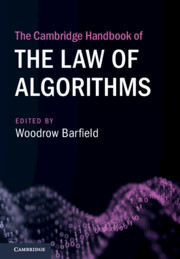Book contents
- The Cambridge Handbook of the Law of Algorithms
- The Cambridge Handbook of the Law of Algorithms
- Copyright page
- Contents
- Figures
- Tables
- Notes on Contributors
- Foreword
- Preface
- Acknowledgements
- Abbreviations
- Part I Introduction and Setting the Stage for a Law of Algorithms
- Part II Business, Regulations, and Decision-Making with Algorithms
- Part III Intellectual Property and Algorithms
- Part IV Criminal Law, Tort Issues, and Algorithms
- Part V Constitutional Law, Human Rights, and Algorithms
- 24 Human Rights-Based Approach to AI and Algorithms
- 25 Four Modes of Speech Protection for Algorithms
- 26 Algorithms and Freedom of Expression
- 27 Artificial Minds in First Amendment Borderlands
- 28 The First Amendment and Algorithms
- 29 Algorithmic Analysis of Social Behavior for Profiling, Ranking, and Assessment
- 30 Algorithmic Stages in Privacy of Data Analytics
- Part VI Applications and Future Directions of Law and Algorithms
- Index
26 - Algorithms and Freedom of Expression
from Part V - Constitutional Law, Human Rights, and Algorithms
Published online by Cambridge University Press: 19 October 2020
- The Cambridge Handbook of the Law of Algorithms
- The Cambridge Handbook of the Law of Algorithms
- Copyright page
- Contents
- Figures
- Tables
- Notes on Contributors
- Foreword
- Preface
- Acknowledgements
- Abbreviations
- Part I Introduction and Setting the Stage for a Law of Algorithms
- Part II Business, Regulations, and Decision-Making with Algorithms
- Part III Intellectual Property and Algorithms
- Part IV Criminal Law, Tort Issues, and Algorithms
- Part V Constitutional Law, Human Rights, and Algorithms
- 24 Human Rights-Based Approach to AI and Algorithms
- 25 Four Modes of Speech Protection for Algorithms
- 26 Algorithms and Freedom of Expression
- 27 Artificial Minds in First Amendment Borderlands
- 28 The First Amendment and Algorithms
- 29 Algorithmic Analysis of Social Behavior for Profiling, Ranking, and Assessment
- 30 Algorithmic Stages in Privacy of Data Analytics
- Part VI Applications and Future Directions of Law and Algorithms
- Index
Summary
This chapter addresses whether and when content generated by an algorithm should be considered “expression” deserving of legal protection. Free expression has been described as “the matrix, the indispensable condition, of nearly every other form of freedom.”1 It receives extensive protection in many countries through legislation, constitutional rights, and the common law.2 Despite its deep roots, however, freedom of expression has unsettled boundaries. At their cutting edge lies the problem of “speech” produced by algorithms, a phenomenon that challenges traditional accounts of freedom of expression and impacts the balance of power between producers and consumers of algorithmically generated content.3
Keywords
Information
- Type
- Chapter
- Information
- The Cambridge Handbook of the Law of Algorithms , pp. 558 - 578Publisher: Cambridge University PressPrint publication year: 2020
